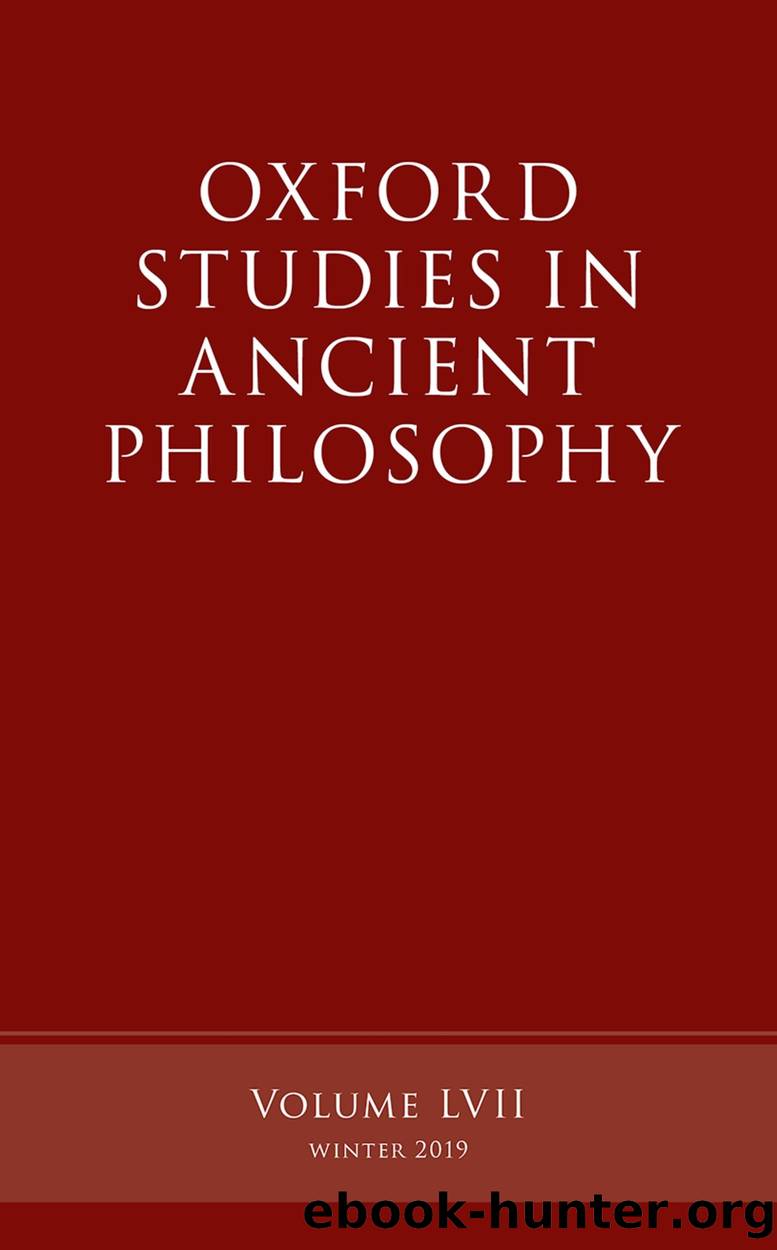Oxford Studies in Ancient Philosophy, Volume 57 by Victor Caston;

Author:Victor Caston; [Caston, Victor]
Language: eng
Format: epub
ISBN: 9780192591425
Publisher: OUP Premium
Published: 2019-12-17T00:00:00+00:00
Virtue and Goals of Actions in Aristotleâs Ethical Treatises
Hendrik Lorenz
The present paper focuses on Aristotleâs claim in the Eudemian Ethics that the virtues of character are âstates to do with decisionâ (ÏÏοαιÏεÏικαὶ á¼Î¾ÎµÎ¹Ï), by which he means that they are somehow responsible for decisions.1 In the paperâs first two sections, I explicate the way in which he thinks the character-virtues contribute to the correctness of the virtuous personâs decisions. In two subsequent sections, I then articulate two philosophical objections to the picture that will have emerged. I defend Aristotle against the first objection. In articulating the second objection, I rely on texts from the Nicomachean Ethics and the De motu animalium that John Cooperâs work on Aristotleâs moral psychology has greatly illuminated. I will argue that the second objection cannot be answered in a satisfactory way, and that it identifies a philosophical weakness in the moral psychology of the Eudemian Ethics.
I should say at the outset that in discussing Aristotleâs Eudemian Ethics in my first two sections, I attempt to limit myself, as much as seems reasonably possible, to materials presented in the Eudemian Ethics. Like many others, I believe that the Eudemian Ethics preserves for us a stage of Aristotleâs thought in ethics that is earlier than the Nicomachean Ethics.2 If so, we should not assume that the ideas presented in the earlier work are always in agreement with those of the later work. I happen to think that the Eudemian Ethics conception of character-virtue is different from the Nicomachean Ethics conception, in that on the Eudemian Ethics conception character-virtue is a non-rational state, whereas on the Nicomachean Ethics conception it is in part a rational state, which includes the capacity to deliberate well about how to accomplish situation-specific goals.3 Many scholars of Aristotleâs ethics disagree with this.4 But to make progress on the issue, one thing we need to do is to look closely at the extant books that are uncontroversially Eudemianâthose are Books 1â3, and 7 and 8âand see whether we are in a position to reconstruct a Eudemian conception of character-virtue. The present paper is an attempt to reconstruct and evaluate this conception.
Download
This site does not store any files on its server. We only index and link to content provided by other sites. Please contact the content providers to delete copyright contents if any and email us, we'll remove relevant links or contents immediately.
Verus Israel: Study of the Relations Between Christians and Jews in the Roman Empire, AD 135-425 by Marcel Simon(551)
Infocracy by Byung-Chul Han(537)
Caesar Rules: The Emperor in the Changing Roman World (c. 50 BC â AD 565) by Olivier Hekster(529)
Europe, Strategy and Armed Forces by Sven Biscop Jo Coelmont(477)
Banned in the U.S.A. : A Reference Guide to Book Censorship in Schools and Public Libraries by Herbert N. Foerstel(444)
Reading Colonial Japan by Mason Michele;Lee Helen;(443)
The Roman World 44 BC-AD 180 by Martin Goodman(436)
Give Me Liberty, Seventh Edition by Foner Eric & DuVal Kathleen & McGirr Lisa(435)
DS001-THE MAN OF BRONZE by J.R.A(421)
The Dangerous Life and Ideas of Diogenes the Cynic by Jean-Manuel Roubineau(417)
The Oxford History of World War II by Richard Overy(414)
Introducing Christian Ethics by Samuel Wells and Ben Quash with Rebekah Eklund(412)
american english file 1 student book 3rd edition by Unknown(410)
Imperial Rome AD 193 - 284 by Ando Clifford(408)
Basic japanese A grammar and workbook by Unknown(389)
Literary Mathematics by Michael Gavin;(373)
Language Hacking Mandarin by Benny Lewis & Dr. Licheng Gu(351)
How to Reach the 9.0 in IELTS Academic Reading by IELTS Medical(333)
The Oxford History of the Renaissance by Campbell Gordon;(331)
